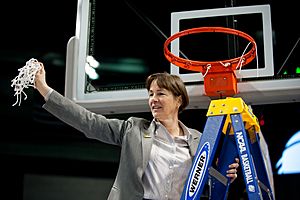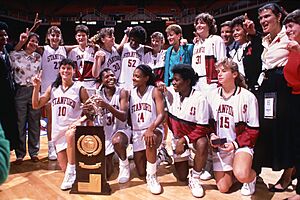Tara VanDerveer facts for kids

VanDerveer cutting down the nets after the Elite 8 game in the 2011 NCAA Division I tournament
|
|||||||||||||||||||||||||||||||||||||||||
| Biographical details | |||||||||||||||||||||||||||||||||||||||||
|---|---|---|---|---|---|---|---|---|---|---|---|---|---|---|---|---|---|---|---|---|---|---|---|---|---|---|---|---|---|---|---|---|---|---|---|---|---|---|---|---|---|
| Born | June 26, 1953 Melrose, Massachusetts, U.S. |
||||||||||||||||||||||||||||||||||||||||
| Playing career | |||||||||||||||||||||||||||||||||||||||||
| Basketball | |||||||||||||||||||||||||||||||||||||||||
| 1972–1975 | Indiana | ||||||||||||||||||||||||||||||||||||||||
| Position(s) | Guard | ||||||||||||||||||||||||||||||||||||||||
| Coaching career (HC unless noted) | |||||||||||||||||||||||||||||||||||||||||
| 1976–1978 | Ohio State (assistant) | ||||||||||||||||||||||||||||||||||||||||
| 1978–1980 | Idaho | ||||||||||||||||||||||||||||||||||||||||
| 1980–1985 | Ohio State | ||||||||||||||||||||||||||||||||||||||||
| 1986–2024 | Stanford | ||||||||||||||||||||||||||||||||||||||||
| National team | |||||||||||||||||||||||||||||||||||||||||
| 1995–1996 | USA | ||||||||||||||||||||||||||||||||||||||||
| Head coaching record | |||||||||||||||||||||||||||||||||||||||||
| Overall | 1,216–271 (.818) | ||||||||||||||||||||||||||||||||||||||||
| Tournaments | 0–1 (AIAW Division II) 104–36 (NCAA Division I) 5–1 (Big Ten) 27–2 (Pac-10) 29–6 (Pac-12) |
||||||||||||||||||||||||||||||||||||||||
| Accomplishments and honors | |||||||||||||||||||||||||||||||||||||||||
| Championships | |||||||||||||||||||||||||||||||||||||||||
|
|||||||||||||||||||||||||||||||||||||||||
| Awards | |||||||||||||||||||||||||||||||||||||||||
|
|||||||||||||||||||||||||||||||||||||||||
| Basketball Hall of Fame Inducted in 2011 (profile) |
|||||||||||||||||||||||||||||||||||||||||
| Women's Basketball Hall of Fame | |||||||||||||||||||||||||||||||||||||||||
|
Medal record
|
|||||||||||||||||||||||||||||||||||||||||
Tara Ann VanDerveer (born June 26, 1953) is a famous American basketball coach. She was the head coach for the Stanford University women's basketball team from 1985 until she retired in 2024.
Tara VanDerveer led the Stanford Cardinal to win three national championships in 1990, 1992, and 2021. She also took a year off from Stanford to coach the U.S. women's national team to a gold medal at the 1996 Olympic Games.
She was named National Coach of the Year multiple times. In 2002, she was inducted into the Women's Basketball Hall of Fame. Tara VanDerveer is known for winning more games than almost any other college basketball coach, male or female. She retired with 1,216 career wins.
Contents
Early Life and Basketball Beginnings
Tara VanDerveer was born on June 26, 1953, in Melrose, Massachusetts. She grew up in a small town near Schenectady, New York.
When she was young, there were no sports teams for girls at her first high school. So, she played basketball and other sports in local leagues and pickup games. She often played with boys. To make sure she got picked for games, she bought the best basketball she could afford. This way, if the boys wanted to use her ball, they had to let her play!
Her family moved to Niagara Falls when she was in her second year of high school. She started playing basketball again after transferring to Buffalo Seminary, an all-girls school. She later earned a spot in the Buffalo Seminary's Athletic Hall of Fame.
College Basketball Journey
Tara VanDerveer was determined to play basketball in college. She first attended Albany. The team wasn't very competitive, but she knew the coach. Even though she was a freshman, she led the team in many areas.
She wanted a bigger challenge. So, she went to the AIAW National Championship, which was like the NCAA tournament before it existed. She watched many teams and decided to transfer to Indiana. She played there for three years and made the Dean's List every year. In 1973, she helped her team reach the Final Four of the AIAW championship.
At Indiana, the men's basketball team was coached by the famous Bobby Knight. Tara VanDerveer took his coaching classes and watched his team's practices. She learned a lot from him and used those lessons in her own coaching career.
Becoming a Coach
After college, Tara VanDerveer took a year off. Her parents encouraged her to help coach her younger sister Marie's basketball team. Even though the girls on the team weren't always committed, Tara found that she loved coaching basketball.
This experience inspired her to become a coach. She applied for assistant coaching jobs at many colleges. She got a position at Ohio State as an assistant coach for the main team and head coach for the junior varsity (JV) team.
In her first year, her JV team won all eight of their games! After two years at Ohio State, she earned a master's degree in sports administration.
Coaching at Idaho
Tara VanDerveer then became the head coach at the University of Idaho in Moscow. Before she arrived, the Vandals had only one winning season in four years.
In her first year, the team improved to 17 wins and 8 losses. The next season, they had an amazing 25 wins and 6 losses. This success earned them an invitation to the Division II AIAW tournament. These early wins are part of her impressive career total.
Return to Ohio State
After Idaho, VanDerveer returned to Ohio State as head coach in 1980. She led the team to great success. In February 1985, her team played against Iowa in a record-breaking game. Over 22,000 fans watched, which was the largest crowd ever for a women's basketball game at that time. Ohio State won the game.
Building a Dynasty at Stanford
By 1985, Tara VanDerveer had made Ohio State a top team. They were ranked number 7 in the country. At the same time, the Stanford women's basketball team was struggling. They had only won 9 games the year before.
Despite this challenge, Stanford convinced VanDerveer to become their head coach. Her friends and even her dad thought it was a bad idea. They said Stanford was "too brainy" for sports. But she took the job.
Her first year at Stanford was tough, with a 13-15 record. The next year was similar. But by her third year, she had recruited her own players and taught them her coaching style. Stanford's record jumped to 27-5, and they made it to the NCAA tournament for the first time in years. They reached the "Sweet Sixteen" round. From then on, her team made the tournament every year.
In 1990, Stanford reached the Final Four. They beat Virginia and then faced Auburn in the championship game. Auburn had been the runner-up in the previous two tournaments. Stanford won, earning Tara VanDerveer and the team their first national championship!
By 2019, Stanford had won two NCAA championships and made 12 trips to the Final Four. On December 16, 2020, VanDerveer broke the record for most wins in women's college basketball history, passing the legendary Pat Summitt.
In April 2021, Tara VanDerveer coached the Cardinal to their third NCAA title. They won a close game against South Carolina in the Final Four and then beat their rival Arizona Wildcats in the championship game. This was their first title in 29 years.
On April 9, 2024, Tara VanDerveer announced her retirement after 38 seasons. She finished her coaching career with 1,216 wins. In November 2024, Geno Auriemma, another famous coach, passed her record.
Coaching the National Team
In the early 1990s, the U.S. women's national basketball team was not winning as much as before. USA Basketball decided to try something new. Instead of forming a team just a few weeks before a big event, they decided to create a full-time national team. This team would stay together for a whole year to prepare for the 1996 Olympics.
Tara VanDerveer was chosen as the head coach. She took a year off from Stanford to lead the team. She had coached USA Basketball teams before, including leading a team to a gold medal at the 1991 World University Games.
Her Olympic team was incredibly successful. They played 60 games against college and national teams before the Olympics and won every single one! At the 1996 Olympics in Atlanta, they won all eight of their games. They beat Brazil in the championship game, earning the USA their third Olympic gold medal in women's basketball. This team is considered one of the best ever assembled.
Coaching Tree
Many of Tara VanDerveer's players and assistant coaches have gone on to become head coaches themselves. This shows how much she influenced them and helped them grow.
| Name | Most recent head coaching position | Years with VanDerveer |
|---|---|---|
| Jennifer Azzi | San Francisco (2010–2016) | 1987–1990 (player) |
| Beth Burns | San Diego State (1989–1997, 2005–2013) | 2004–2005 (strength and conditioning coach) |
| June Daugherty | Washington State (2007–2018) | 1985–1989 (assistant coach) |
| Molly Goodenbour | San Francisco (2016–present) | 1989–1993 (player) |
| Bobbie Kelsey | Wisconsin (2011–2016) | 1992–1996 (player), 2007–2011 (assistant coach) |
| Lindy La Rocque | UNLV (2020–present) | 2009–2012 (player), 2017–2020 (assistant coach) |
| Karen Middleton | Wisconsin–La Crosse (2016–2023) | 1997–2007 (assistant coach) |
| Kate Paye | Stanford (2024–present) | 1991–1995 (player), 2007–2016 (assistant coach), 2016–2024 (associate HC) |
| Nicole Powell | UC Riverside (2020–2023) | 2000–2004 (player) |
| Julie Rousseau | Pepperdine (2004–2013) | 2000–2004 (assistant coach) |
| Charmin Smith | California (2019–present) | 1994–1997 (player), 2004–2007 (assistant coach) |
| Charli Turner Thorne | Arizona State (1996–2022) | 1985–1988 (player) |
| Heidi VanDerveer | UC San Diego (2012–present) | 2003–2004 (video coordinator) |
Awards and Honors
Tara VanDerveer has received many awards for her coaching:
- 1984, 1985 – Big Ten Coach of the Year
- 1988, 1989, 1990, 2011, 2020 – National Coach of the Year
- 1995 – Amos Alonzo Stagg Coaching Award
- 1995 – Indiana University Hall of Fame
- 1998 – International Women's Sports Hall of Fame (Coach category)
- 2002 – Elected to the Women's Basketball Hall of Fame
- 2011 – Named to the Naismith Memorial Basketball Hall of Fame
- 2011 – Naismith College Coach of the Year
- 2011 – AP College Basketball Coach of the Year
- 2018 – Carol Eckman Award
- 2024 – Golden Plate Award of the American Academy of Achievement
Personal Life
Tara VanDerveer never married and does not have children. She loves playing the piano. Her sister, Heidi VanDerveer, is also a basketball coach and is currently the head coach at UC San Diego.
In her time off, Tara VanDerveer enjoys waterskiing at her cabin on a private lake in Minnesota.
See also
 In Spanish: Tara VanDerveer para niños
In Spanish: Tara VanDerveer para niños


